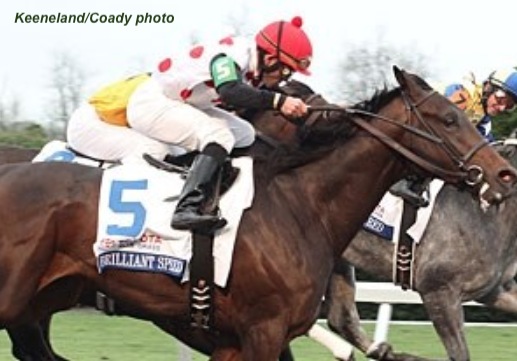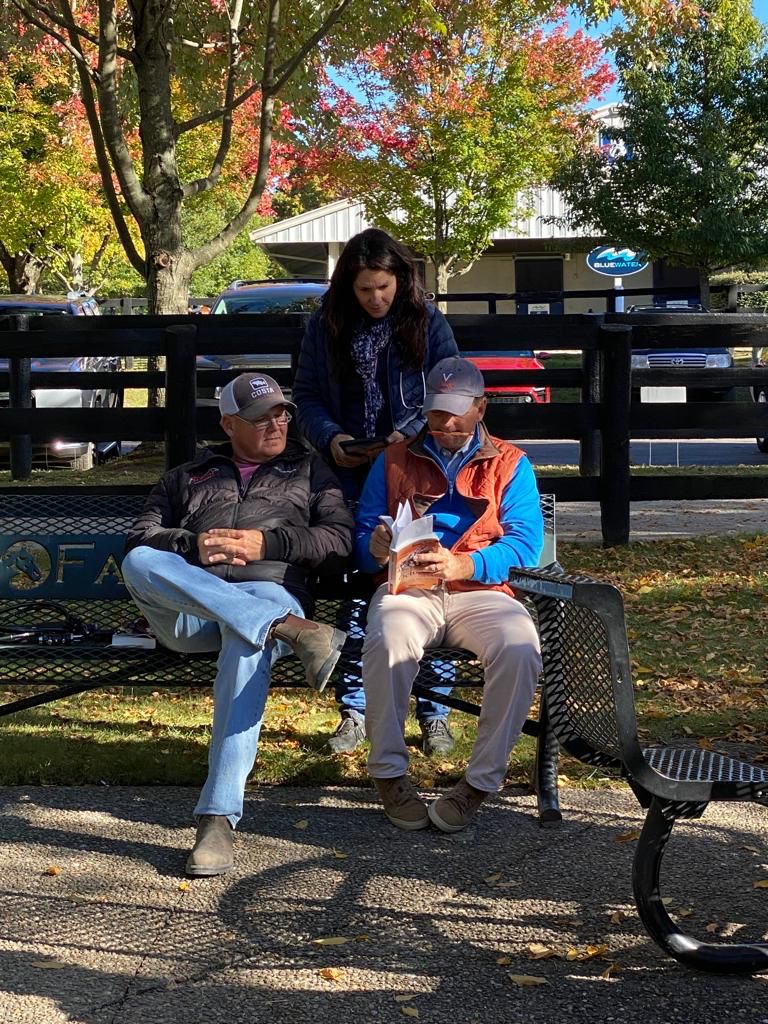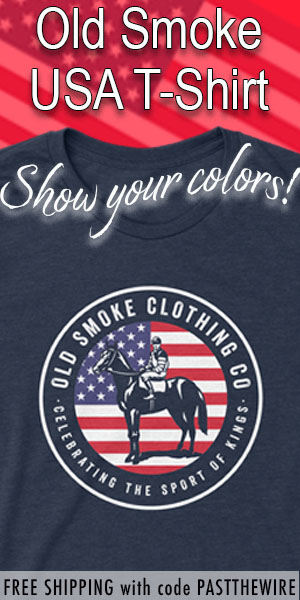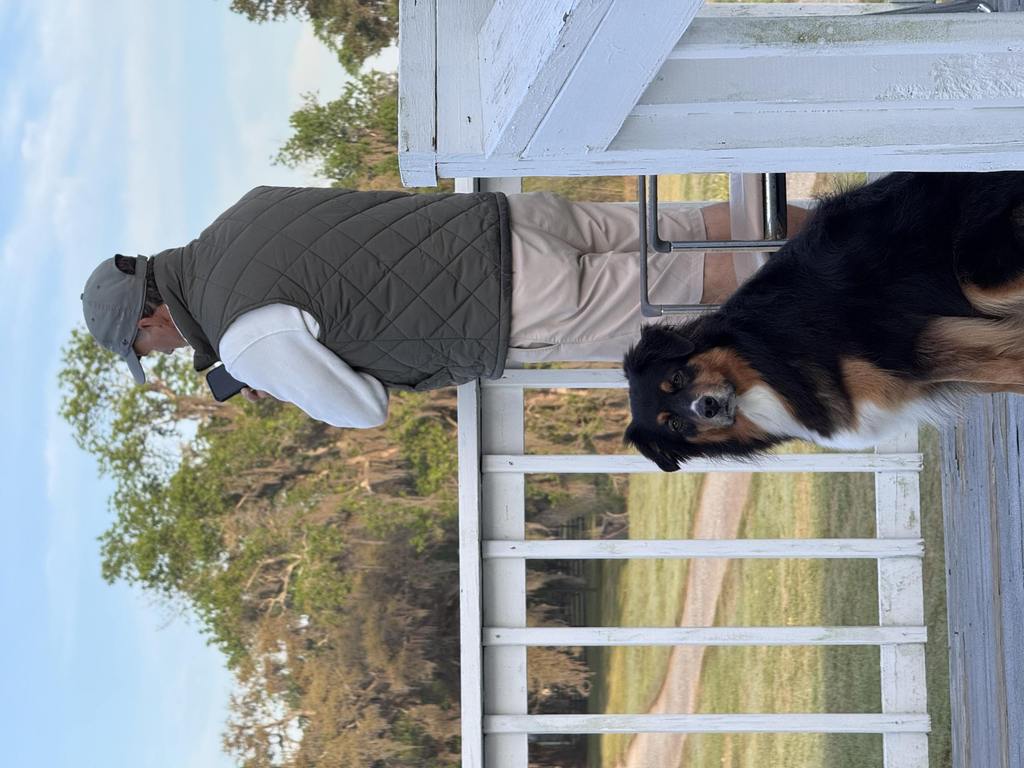
Randy Miles at the viewing stand at Crupi’s New Castle Farm with his dog Dash. (Photo courtesy of Randy Miles)
By Ben Baugh
Randy Miles was introduced to horses at an early age by his father, having the opportunity to learn about the equine industry and Thoroughbred racing, as his father had horses and was involved on a part-time basis, doing them before work, after work and whenever he had free time. Miles’ father loved to ride, and that was his niche.
However, little did he know that those early experiences would eventually be life transforming.
Early exposure to the industry
The future 2-year-old consignor would get exposure to the sales through his father.
“He would always go to the yearling sales back then, even back then, we had sales in Virginia, which is probably unheard of now,” said Miles. “Going back in the 70s, we had yearling sales in Virginia. He would go and buy two or three horses every year, bring them home and break them himself. He had a lot of clients in Maryland that he would sell them to.”
That early introduction would provide him with a foundation and an intimate look into what the industry had to offer.
“Back then, the 2-year-old sales weren’t even heard of yet,” said Miles. “He would sell to clients in Virginia. It was a way for him to supplement his income, something he enjoyed doing. So, I always grew up around it.”
The ability to grow up in the Mid-Atlantic offered him the opportunity to experience life at the track and the races, becoming acquainted not only with prep work, training and the sales, but life on the backside.
“I was always at the races,” said Miles. “I laugh every time I go to the Timonium Sale in Maryland. We still have win photos and that was the first winner’s circle that I ever stood in was in Timonium, Maryland. Every time I go back, I think about it. I grew up around it, I noticed that it took a lot of hard work and a lot of dedication, even with two or three horses, you had to be dedicated to it.”
Temporary detour
However, the thought of becoming involved in the Thoroughbred industry as a vocation seemed somewhat remote to Miles, even though his fate seemed to suggest something else.
“I never thought that I would be a horseman or be in the horse game for a living,” said Miles. “I never thought I’d be responsible enough, I never thought I’d be good enough, I always liked the horses. I always got along with the horses. I never thought I would do it.”
After leaving college, Miles entered the corporate world, and worked in consumer sales for a major company, but made a keen observation about those he worked with, and their lifestyle, making him wonder whether or not he had made the right career decision.
“I noticed at that point, I was in my mid-20s, that the people that had the same jobs that I did, didn’t have any control of their life,” said Miles. “They could give a company 20 years and they could be let go. They could not be given the opportunity to retire. They were just let go. They had two to three weeks of vacation every year. I noticed the people that had the same job that I had didn’t have any control over their lives. That was my motivation to find something that I could get out of what I put into it.”
Timely transformation
His life was about to change direction, realizing there had been a deep passion about something all along, one that he was about to make a commitment to that would forever alter his life. Miles keen sense of observation, life and professional experiences, allowed him to get a better grasp of understanding and see things differently.
“My father sold horses like this for years and years, and I never really paid attention to the monetary value that he pulled out of it, until I was in my mid-20s,” said Miles. “And then I started noticing, we’re talking mid-80s. Money is relative He was making $15k on this horse, $20K on this horse, and here’s a guy making $50,000 a year, and I’m thinking man, if we just had 10 horses, that’s $200,000 or $150,000. So, I started doing the math and it was really funny, I wasn’t a bad kid, but I didn’t have any sense of responsibility, I was in my mid-20s. I always laugh today, because I say, a young male is at his dumbest when he’s in his 20s.”
When Miles approached his father about the possibility of transitioning into the Thoroughbred industry, he was met with a less than enthusiastic response.
“I was not the most responsible, so I brought the idea up to my dad,” said Miles. “He said, this game is not for you, you’re not made to take care of these animals, if you’re going to give your life to these animals, it’s not good for a family. That’s what kept him from doing it fulltime was, he was more of a family man. He didn’t want to go to the racetrack. He wanted to spend time with his family. I was attracted to the horses, the power and the beauty, I had so much respect for them.”
Life altering decision
However, Miles determined to make a go of it, understanding it would be extremely challenging but his passion for the Thoroughbred industry was palpable, and he took a leap of faith by looking through the classified section in a trade magazine. A propitious opportunity would present itself, starting Miles on a sojourn that he could’ve never imagined. Miles would also meet a man who became one of his idols, a mentor and someone he’s patterned his way of doing business after in the Thoroughbred industry.
“I said, ‘I think my mind’s made up. I’m going to give this a shot,” said Miles. “So, I opened the Blood-Horse magazine, the first ad I came to was Crestwood Farm in Kentucky, and they weren’t a big farm, it was as if it was divine intervention. I have been so lucky and so fortunate. I called Crestwood Farm and asked if there was an opportunity to go out and work. Thank goodness that I was on the phone with Pope McLean Jr. He and I talked on the phone for a while, he said, ‘we have a job for you, if you come here, you can live on the farm.’ So, I went out there and worked for them for maybe a year. Pope Mclean, who’s now in his 80s, is such a gentleman. In my 30 years of working in this business, I’ve never heard one person say anything wrong or negative about Mr. McLean.”
The experience at Crestwood Farm provided Miles with a number of opportunities, meeting new people and networking, while adding to his existing skillset, as he began finding himself in the business. Miles time at Crestwood also made a strong impression that resonated deeply with someone who was a bit skeptical about his decision.
“He (Pope McLean) treated me like his own son. I’m still amazed at how open and nice his family were to me,” said Miles. “He had two sons, Mark and Pope. We were all around the same age, and we all lived in the same house. We had the most fun. At that time, Pope Jr., was friends with the Bozo family from over in France, and now when you look back at it, at the same time I was working on the farm, Henri Bozo was at the farm. And now, he’s one of the leading farm owners in France. He’s very strong in French racing, and we were all there together at the same time.
“We still cut up at Keeneland November, about all the stories, we were young and just trying to find our way in the business,” said Miles. “He (Bozo) was there doing an internship at their farm. I absolutely loved it. I just loved being out there. After a year, and after my father saw that I was serious and dedicated to it.”
Critical connections
The experience at Crestwood provided Miles with greater insight, and as he grew in self-confidence, he began to make connections that would open additional doors, paving the gateway to success. He would meet two women who would change the complexion of his life.
“After a year, I left Crestwood and came back to the farm in Virginia,” said Miles. “We started buying horses, and that only lasted for two years, and I outgrew the farm. I met my future wife. She’s a veterinarian. We both moved from Richmond to Charlottesville, which was another blessing. I don’t know how all these things happened. I got to meet my dear friend Debbie Easter. Debbie Easter is probably the most-known person when it comes to Virginia racing. She played a big part in Colonial Downs opening back up. She’s still my best friend today. We started doing a lot of work together in Charlottesville.”
A return home to Virginia would lead to additional contacts who would play a role in encouraging Miles to reach for the next level, recognizing his potential, making critical connections as his career began to progress.
“My business kept growing through Debbie and her contacts. We started getting better horses, not only through Debbie, but through Chris Baker. Chirs Baker was running Ned Evans’ farm. Chris and Debbie were the first two to give me a shot at selling major horses. I always sold horses that I could afford. I would always pinhook $5,000 to $10,000 horses and hopefully sell them for $50,000. That was a decent living, and it gave me time to learn. I had to learn from all of my mistakes, but Chris and Debbie were really big in giving me some of the big ones. Chris gave me some of Mr. Evans’ horses to sell.
Relocation to the Sunshine State
However, there were some challenges associated with being in the Mid-Atlantic when it came to bringing his horses to the 2-year-old sales because of the seasonal climate. So, Miles would make some adjustments, moving his operation further south so he could adapt to the annual sales calendar more seamlessly.
“By being in Virginia, I could never make the early sales, we had the early sales back then in February, there was still snow on the ground in Virginia,” said Miles. “So, the first sales I could do were Keeneland, we had the 2-year-old sales at Keeneland and Maryland. So, we did that and had huge success the first two years I was in Charlottesville, and the better horses kept coming. And then I had to make a decision. These guys are giving me opportunities. I have to change my plan of operation.”
Miles would shift his base to Florida, dividing his time for two years between his home state, and a place that would begin to play a significant role in his career.
“I moved the operation to Ocala, so I could get the horses ready for the early sales,” said Miles. “One of our dear friends, who’s not with us anymore, was Bill Graves. Debbie, Bill and I were really close friends, and Bill was another one, it was just divine intervention again. All of sudden, I’m getting support from Fasig-Tipton’s major player, Bill Graves. Bill pushed Debbie and I to buy better horses. Everything that we bought and sold, it just worked.”
More changes were on the horizon, as Miles navigated his way through the world of juvenile sales, and in doing so it helped him rise to a new level, where he enjoyed more success. A training center in Morriston, Fla. would result in a significant result for his training program. But there were external challenges that would impact the thoroughbred industry. However, they would lead to additional opportunities and connections.
Grade one glory
Point Ashley was a Kentucky-bred mare by dual Classic winner and 2001 Horse of the Year Point Given, out of the Slew O’Gold broodmare Golden Thatch. Miles consigned the horse to the 2006 Keeneland April Sale, and she was purchased by Zayat Stables.
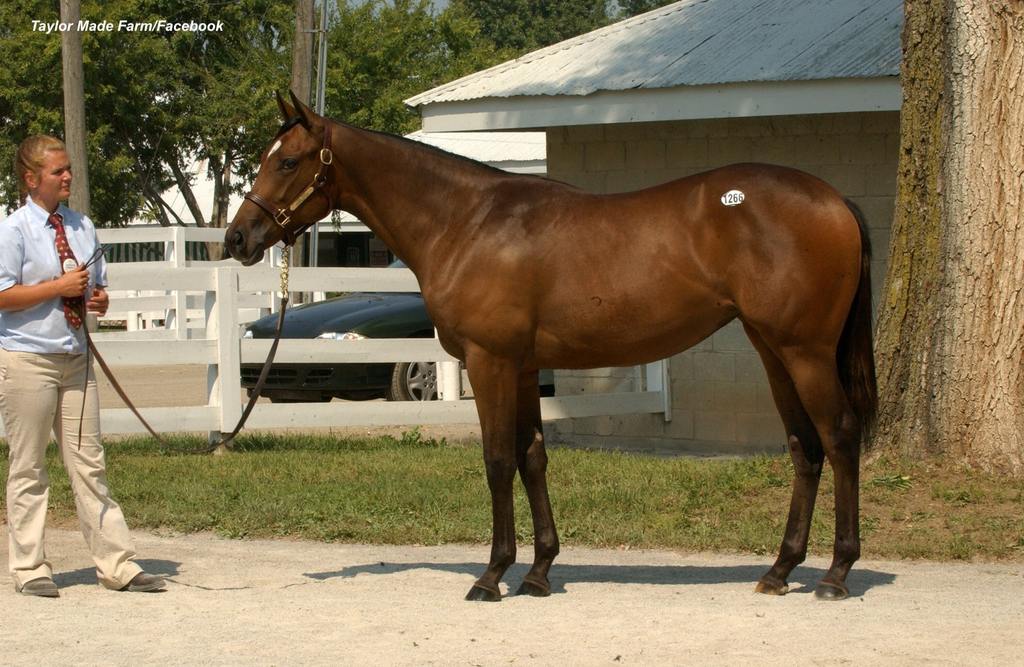
Point Ashley was conditioned by Hall of Fame trainer Bob Baffert and won the Grade One Del Mar Debutante Stakes under the confident handling of Victor Espinoza by 2 ½-lengths during her juvenile campaign. She followed that performance with a second-place finish in the Oak Leaf Breeders’ Cup Stakes (Gr. 1).
“The first year I moved down here I was at Oak Ridge,” said Miles. ”I stayed there for maybe two or three years. We had so many good horses. We had Point Ashley who was one of the first Grade One winners to come out of my operation, and that was back when I was at Oak Ridge. We bought her for $100,000 and sold her to Baffert and Mr. Zayat at that time. It was a big push in the right direction when that happened. So, then once we ran the operation out of Florida for two years, I eventually moved down for another two years fully without Lisa, and now we’re getting into the time we had an economic pullback.”
Adjusting and adapting
The economic downturn that came about as a result of the subprime bubble bursting and the resulting recession, made a number of people reevaluate their business models, and Miles would find himself transitioning into another role during this time period.
He would connect with one of the industry’s most respected names, the pioneer of Thoroughbred racing owner partnerships and arguably the sport’s most beloved raconteur. Dogwood Stable’s W. Cothran “Cot” Campbell.
“I helped Cot for two years buying horses because he called me when he noticed I didn’t have anything in the first sale at Gulfstream, and he asked if I would be willing to go down and be his point man and scout out the horses for him to come down and buy,” said Miles. “I went down a week ahead of time and scouted the horses out. I think he came down the day of the sale and we bought four or five horses, the way he does, and that was so impressive to me, So, I got to see a whole other side of the business doing that. So, I helped Cot for two or three years.”
Perfect Timing
Once again, Miles would find himself transitioning within the industry, adding invaluable experience, making new connections, as part of his evolution as a horseman, and this time it would be a friend, who would present him with a fortuitous opportunity.
“Chester Weber called me. He said, ‘Randy, we’re thinking about hiring a new farm trainer for the farm.’” said Miles. “He said, ‘I just wanted to know if there’s anyone out there that you know of anyone that would be right for the job.’ It was right during that economic downturn, when nobody really knew what was going to happen during the 2-year-old sales. The numbers were going down. I talked about it with my wife Lisa, I said, what do you think about maybe us doing it. It’s a guaranteed paycheck, a great farm and a great opportunity. So, I called Chester back, and I said, ’Chester, I think I found somebody for your job.’ He said, ‘who are you thinking of,’ I said, ‘me.’ I said, ‘I would be interested in talking to you about the job.’ We took the job, and it was four wonderful years at that farm, and to this day, Charlotte Weber and I are good friends.”
Quality and success at the highest level
Miles worked at Live Oak for four years, and had the opportunity to meet many of the biggest names in the Thoroughbred industry, forging friendships that would last for years, including with the late trainer Christophe Clement, who he would become extremely close with as he was one of Mrs. Weber’s trainers, and their friendship continued until Clement’s untimely passing in the spring of 2025. He had the opportunity to work with trainers Bill Mott, Graham Motion and Tom Albertrani, all of whom he still counts among his friends.
Live Oak Plantation enjoyed great success while Miles was based at the world class operation, with many of the runners earning black-type status, winning many of the biggest races in North America.
The versatile Live Oak homebred Brilliant Speed, a Son of Dynaformer out of the Gone West Broodmare Speed Succeeds, bankrolled $1,203,531. The Tom Albertrani charge won 2011 Toyota Blue Grass Stakes (Gr.1) and in doing so stamped his ticket to the Kentucky Derby Presented by Yum Brands!
Brilliant Speed’s switch to the turf added to his Blue Grass victory during his sophomore campaign, as later that summer he won the Saranac Stakes (Gr. 3) by 2 ½-lengths at Saratoga.
To Honor and Serve was conditioned by Hall of Fame Trainer Bill Mott, and the Live Oak charge by Bernardini, out of the Deputy Minister broodmare Pilfer, found New York to his liking scoring consecutive wins in graded stakes races in the fall of his juvenile campaign at Aqueduct, a 4-length victory in the Grade Two Nashua, and he followed that up with an impressive win in the Remsen Stakes (Gr. 2).
However, more was yet to come, as he won the Pennsylvania Stakes (Gr. 2) at Parx, and the Cigar Mile Handicap (Gr. 1) at Aqueduct later in the fall of his sophomore year.
His consistency and professionalism seemed to improve with age as at age four, To Honor and Serve scored a 4 ½-length win in the spring at Belmont Park in the Westchester Stakes (Gr.3) and then enjoyed summer fun at Saratoga Race Course with a win in the Grade One Woodward Stakes.
The gray gelding World Approval trained by Hall of Fame conditioner Mark Casse, would earn more than $3 million dollars and the hearts of Thoroughbred racing fans throughout North America. The Live Oak Plantation homebred won three stakes during his 3-year-old campaign, the Sophomore Turf Stakes at Tampa Bay Downs, and then two graded scores, the American Derby (Gr. 3) at Arlington Park and the Saranac Stakes (Gr. 3) at Saratoga.
The son of Northern Afleet out of the With Approval broodmare Win Approval, captured his first Grade One stakes with a win in the United Nations Handicap at Monmouth Park.
But as a 5-year-old, World Approval would capture global attention, scoring five stakes wins, the E G Vodka Turf Classic Stakes, following that victory with a win in the Wood Reserve Manhattan Stakes (Gr. 1). Those wins would be followed by three consecutive victories including the biggest of his career, as he added the Fourstardave Handicap at Saratoga (Gr.1), the Ricoh Woodbine Mile Stakes (Gr. 1) and ended the year with a win in grand style capturing the Breeders’ Cup Mile (Gr. 1) at Del Mar.
World Approval would make it four straight wins, starting his 6-year-old year with a win in the winter of 2018 in the Tampa Bay Stakes (Gr. 3) at Tampa Bay Downs.
Zo Impressive, a gray daughter of Hard Spun was another Live Oak Plantation homebred trained by Albertrani, who won her first two races, would place second in both the 2012 Gulfstream Park Oaks (Gr. 2) and the Acorn Stakes (Gr. 1) before capturing the middle jewel of the New York Racing Association’s Triple Tiara, the Mother Goose at Belmont Park, and in her next start she finished second in the final leg of the Tiara, the Coaching Club American Oaks at Saratoga.
“It was just an experience that people don’t get to enjoy because of the quality of horses that we dealt with, and it was right during Mrs. Weber’s big run, with To Honor and Serve, in all those Grade One Races in the Breeders’ Cup, we had Brilliant Speed in the Derby and he went onto his turf run. It was a magical time,” said Miles. “It was one Grade One after another. And then, after about four years, it was time for me to go back out on my own. The industry had started to pick back up. And to this day, Charlotte and I still talk. I left on a good note with the whole family.”
Finding one’s place
Miles left his farm manager’s position at Live Oak Plantation but found himself trying to figure out what he wanted to do next in the industry, not knowing exactly where he was going to fit in, but he understood that he had an opportunity to find his niche and improve upon his previous success in the industry.
Prior to accepting the position at Live Oak, Miles had given all of his clients to his good friend Bo Hunt. Many of Miles’ clients were from the Mid-Atlantic and they included multiple graded stakes winning trainer Anthony Dutrow.
“I always gave Bo money, always invested with Bo to pinhook, just because I enjoyed it and always loved the thrill of it, and he was such a good horseman and such a good horse buyer that I was very confident in giving him the money and letting him invest it,” said Miles.
A Call from a friend provided Miles with sound advice and encouragement.
“Christophe (Clement) called me one day on the phone,” said Miles. “He said, ‘I want you to give it six months. After six months, you will find where you need to be.’ I was thinking about taking another private job. He said, ‘you will find out where you need to be in six months.’ That was the best advice someone had ever given me.”
The dream team
A new opportunity would provide both Miles and Hunt with a business partnership that would fit both men seamlessly.
“Within six months, I saw that my friend Bo Hunt was a really good horse buyer, a really good horse trainer, but he struggled at the sales, and he needed someone to help him at the sales,” said Miles. “So, we incorporated a plan, we’d buy all the horses, and we would bring in new clients, I would run the sales division, so my life got really good when we made that decision because I could have a life for nine months out of the year, and sell horses for three months, in that nine-month period. I could support Bo. I could manage the clients, talk to the clients, and Bo could just concentrate on training.”
Over the past decade the partnership has flourished, and their client list has continued to grow.
Miles’ father had always placed a priority on family, wanting his son to be grounded, understanding that, but it wasn’t in the younger Miles makeup, with he and his wife Lisa making the decision long ago not to have children.
“You’re never going to be satisfied with your life, unless you go out there and try to reach your goals,” said Miles. “When I left Virginia, it was very funny, my goal was to work for a big farm. When I finished with Live Oak, I had reached my goal, and I was kind of stagnant after that. I was like, “I’ve reached my goal, what am I going to do now?’ It took me a while to figure it out. But this life that we have, and the friends that we’ve made along the way, they’re our family.”
Integrity and gratitude
The tight-knit closeness of people within the Thoroughbred industry has a deep sense of community about it, and Miles’ philosophy and tenets are to take care of everyone. Miles early experiences at Crestwood Farm have helped shape him into the man that he’s today.
“The mentoring was kind of like a grounding,” said Miles. “It wasn’t so much horse knowledge. It was more of a grounding knowledge, be a good person, and that’s what I picked up from Pope Mclean. I always looked at the fact that nobody ever said anything cross about that man. Everybody loved him, and that’s who I wanted to be. If I had to idolize somebody, it was Pope Mclean. I wanted to have his reputation. Even to this day, I see him at the sales, he’s in his mid-80s, and it’s just a joy to see him at the sales, and I’m very close with his sons, and he allowed me to piggyback off of that family and become friends with all of those people.”
Miles is grateful for the opportunity and the blessings that have come his way and doesn’t take anything for granted.
“To this day, part of what I do, the way I act and treat people is to make Pope proud of me, even though I’m not his son, I try to give back,” said Miles. “I spent time with him, and he took care of me, so I want to give back, so he’ll be proud of me.”
The right stuff
However, the partnership and friendship between Miles and Hunt, both bringing strengths to the equation, have enabled both men to succeed. The personal connection, attributes possessed by both and the ability to understand the vagaries of the marketplace have been beneficial.
“I had been fortunate to have met up with Bo,” said Miles. “That relationship has been good for both of us because he’s been able to do some things he wouldn’t be able to do on his own just by meeting a few people here and there, meeting people through Debbie Easter and myself, Bill and all of my old contacts,” said Miles. “Bo is such a good horse buyer. I’m good, but he’s really good. He can see though a horse and imagine what that horse is going to be like in so many months. I’m never not amazed at his talent. Bo and I operate on a limited budget, not because we have to, but we figured that’s where the best value is, in our limited budget.”
Sticking to the game plan
Budget constraints have played a role in Miles’ and Hunt’s buying strategy, but they have found great success through their expertise, finding outstanding athletes in places others often overlook.
“With our limited budget we go to Keeneland, and you can just imagine we’re trying to buy horses in book three and book four and book five, and we can’t buy what we want,” said Miles. “But we can buy what we want, but we’re not willing to give the money for those types of horses and try to pinhook them. Bo and I are always shopping and do most of our work in book five and book six. I will say this, we have shopped book six every year, for the last 10 years, and we have pulled four or five grade One horses out of book six, which I think is very odd.”
Unearthing gems
One of the first was a horse they purchased for $45,000 in book six out of the Lane’s End consignment.
“We sold him to West Point. He was trained by Dale Romans, and he was Grade One placed,” said Miles.
The following year, the team would find out whether or not they would strike lighting in a jar, not realizing how successful they would be, and it’s a story that Miles and Hunt love to tell.
“There was a filly that we found and loved, and she was by Mizzen Mast. She was on the last day, you always have to be prepared for things that come up,” said Miles. “We’re sitting there in book six midday, and we’re waiting for this filly to come up, and she’s just a big strong filly by Mizzen Mast with no pedigree on the dam’s side. She doesn’t come up to the ring. He said, ‘Randy, go down to the consignment, see where they are, what’s going on with that horse?’ I go down there, the sign is gone, the horses are gone, everybody’s gone. I asked the consignment next to them, ‘where did they go? They said, ‘they didn’t think they were going to get enough money for their horses, so they packed up and left.’”
Rather than let a potential racing prospect get away, Miles reached out to the owner calling them, as he was enamored with the filly.
“I said, ‘hey we were waiting on your filly to come up to the ring, and the woman said, we just decided the owner wasn’t going to get what he wanted for the horse, so we packed up and left,’” said Miles. “I said, ‘well what do you think he’d take for the filly?’ She said, ‘he’s wanting $30,000.’ I said, ‘can we come out to the farm and make sure she got to the farm safely and come and look at her one more time.’ We went out and bought her, bought her for $30,000.”
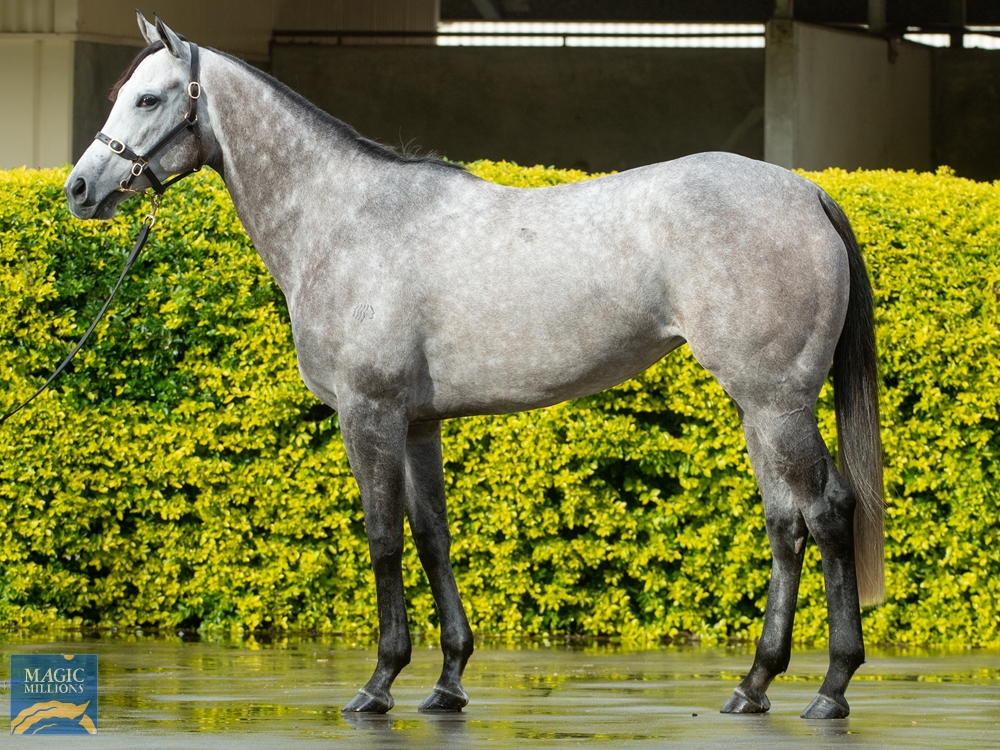
The Filly was Lighthouse, by Mizzen Mast, out of the North Light broodmare More Hoping, who was purchased by Alex Solis II and Jason Litt at the OBS April 2019 Sale for $375,000 for LNJ Foxwoods. The filly would go onto win the Music City Stakes at Kentucky Downs during her sophomore campaign. However, she would become a Grade One winner in Australia, capturing the 2022 Coolmore Classic at Rosehill Racecourse, and go onto sell for more than $2 million as a broodmare prospect.
Another find was that of a son of City Zip, who would win seven races, and bankroll $1,857,642, Snapper Sinclair. Trained by Hall of Fame conditioner Steve Asmussen, Miles and Hunt bought the colt for $30,000 at the Keeneland 2016 Yearling Sale from the Lane’s End Consignment.
Miles would end up selling the future multiple stakes winner and Grade One placed runner, who finished second in the Cigar Mile Handicap (Gr. 1) at Aqueduct, at the OBS April 2017 Sale for $180,000 to Jeffrey Bloom, Bloom Racing Stable, LLC.
“That’s all on Bo,” said Miles. “Yes, I liked the horses, but Bo really keyed on those horses. That just shows his talent. Just the two of us working together and having confidence in each other has just been a great life. It’s hard, it’s challenging sometimes, it takes a lot of dedication, but I think we make it as easy on each other as we possibly can. We try not to make things hard. We try not to overextend ourselves.”
One of the team’s recent success stories made his way onto the cover of the Faisg-Tipton July Catalogue, a son of cupid, out of the Hot N Hectic broodmare Henny Hughes. Owned by West Point Thoroughbreds, Carson’s Run is a four-time stakes winner, which includes two Grade Ones, capturing the bet365 Summer Stakes at Woodbine as a juvenile, and then winning the Saratoga Derby Invitational Stakes (Gr. 1) during his sophomore campaign. He also added the Jockey Club Invitational Stakes (Gr.3) at Belmont at the Big A and won the Tale of the Cat Stakes at Monmouth Park for the late Chirstophe Clement. Carson’s Run is currently in the barn of Miguel Clement.
“I went to July by myself, so we could have representation there,” said Miles. “I worked the sale and looked at all the horses, it was funny I only came up with one horse. You knock off all of the expensive horses. If you knock those off, you know you’re not going to buy those. We weren’t buying for any clients at that sale.”
Love at first sight
Sticking with their sound financial strategy the team discussed the possibility of the lone individual who stood out to Miles, and the two men discussed the prospect in detail before making the decision to purchase the future multiple Grade One winner at the Fasig-Tipton Kentucky Select Yearling Sale 2022.
“We knocked the top half off,” said Miles. “Where can we find value in this sale. I called Bo on the phone, and he said, ‘what do you see? I said, there’s one horse that I want to buy. I noticed that the horse had been bought as a weanling for $30,000 or $40,000 (Pick View purchased the farm from Frankfort Park Farm for $35,000). I don’t know if we’re going to be able to get this horse. He’s by Cupid. He said, ‘do you really want a Cupid?’ It was his second crop. I said, ‘I feel like this is the only horse that we should buy. We end up buying the horse for $67,000 (Cool Hill Farm from Stuart Morris).”
However, the process can be harrowing, with the hope that the racing prospect that seemed to have so much promise lives up to its potential. There are no guarantees.
“I brought him home, and he just trained average,” said Miles. “We took him over to the 2-year-old sale in April and he really thrived on that Polytrack. He worked really super good on the Polytrack. West Point bought him. West Point has been very good to Bo and I. West Point bought him and sent him to Christophe. Christophe got one of his clients to buy half of the horse, Steve Bouchey. Low and behold, we have Carson’s Run.”
Miles and Hunt seem to defy the averages, selecting a one horse that turned out to be a multiple graded stakes winner and has earned $1,630,629, on a limited budget speaks volumes of their program. Carson’s Run sold for $170,000 at the Ocala Breeders’ Sale Spring Sale of 2-Year-Olds in Training.
“To pick one horse out of that wholesale,” said Miles. “We panicked. We didn’t think it was going to be a big hit. Sometimes what you sell them for isn’t the most important thing. Just being able to show people you can buy a horse like Carson’s Run, and he goes on and runs, that’s a big billboard for you. It’s just those types of things that have really been a good blessing for us is buying the right horses. I attribute all that to Bo, he’s taught me so much, about buying horses and not overextending. There are good horses at that level, at that range that we like to buy horses at.”
Derby bound
The Fasig-Tipton New York Saratoga Select Yearling Sale of 2023 would also prove propitious and displayed the team’s talents and outstanding eye for a horse, as they purchased a son of American Pharoah for $600,000 from the consignment of Airdrie Stud Raised and Offered.
“Two years ago, we went to Saratoga, again, Bo didn’t go,” said Miles. “We were helping a good friend of ours, Gus King to buy one horse. He wanted to buy one good horse. So, I worked the sale, and Gus came to me, and he said, ‘well, what do you like?’ and I said, ‘there’s three horses here I like.’ I said, ‘if I were you, I would vet those three horses and then you choose which one you like.’ The one he vetted and chose and worked a partnership out with was Publisher, who ran in this year’s Derby. Again, out of the whole sale, you end up picking the right horse. We’ve been very blessed, lucky yes, blessed yes, all of it. It’s been just good team work to get us to this level.”
Miles and Hunt have enjoyed a successful 2025. Miles has found himself as the leading buying and consignor at a number of sales, validating the decision he made years ago to leave the corporate world and pursue his passion.
“If you would’ve asked me this when I was just getting into the business at 20 years old, and my father and I talk about it,” said Miles.” He said, “how did you end up where you are. You’re the leading buyer in April at OBS, you’re the leading buyer in Maryland, and you’re selling top horses and selling them to the right people. Even in June, you bought the highest priced horse, and sold the second highest priced horse, how did you end up there?’ Divine Intervention is all I can say.”
Doing the right thing
It’s about having respect for what you do and the Thoroughbred industry that motivates Miles. When people see him at the sales or racetrack, he wants them to come by and say hello, establish those connections and relationships.
“I want them to want to associate with me,” said miles. “It’s not about money and what I can get off of this person or can I sell a person this horse. That’s how you go to sleep at night by being content and doing good business. It’s not about the money.”
It’s those relationships that you establish with people within the industry that can make a significant difference, understanding that certain people’s programs play at a specific level, and having a horse that would be best suited for them.
“It goes back to selling horses. How do you sell a horse that’s not your best horse,” said Miles. “It’s easy. Not everybody out there can buy your best horse, the guy that’s got $20,000 or $50,000, he’s got to buy the best horse he can for that amount of money. So, you help that guy, you help him weed though your consignment, this horse is going to really fit you at that track you’re racing at. And this horse is really going to fit you at that track for that amount of money. You have respect for everyone no matter what level. I think that’s just part of loving the game. You just have to love the game and treat everybody with the utmost respect.”
Relationships and Respect
Networking, having the ability to connect with others, a personable demeanor and undeniable integrity, have enabled Miles to forge relationships and friendships with people in the industry that have lasted decades.
“But at every turn I was blessed with the person I was working with, Bill Graves, Debbie Easter, I was fortunate to have them guide me along the way,” said Miles. “I made plenty of mistakes. You learn from those mistakes, don’t do them again.”
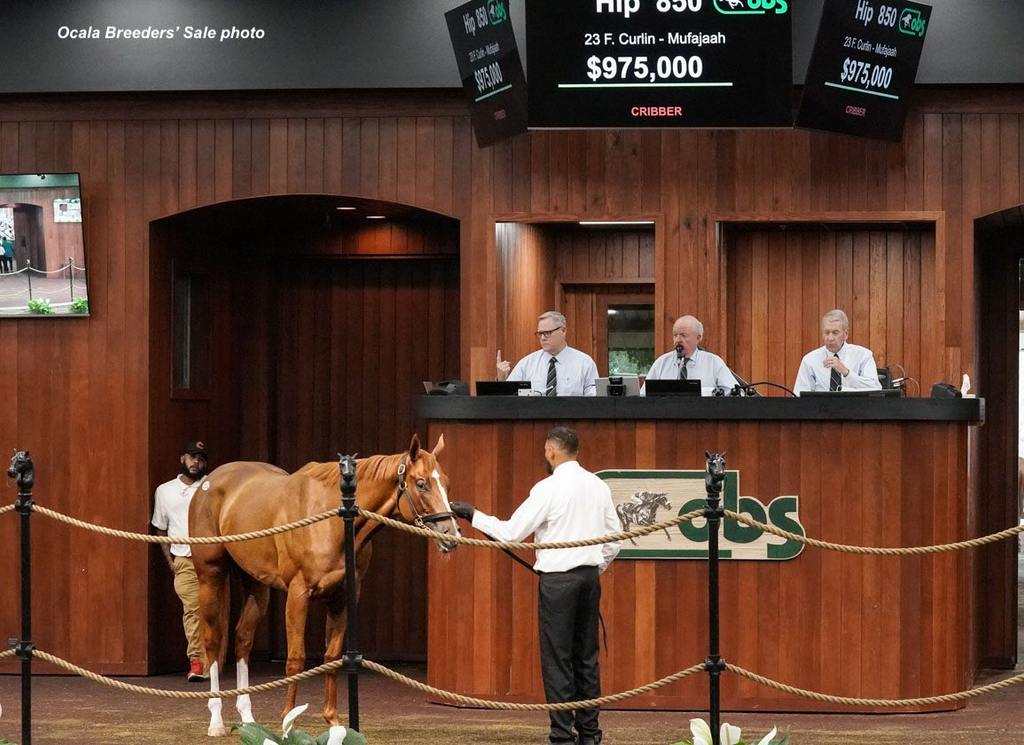
A strong team, built on trust and understanding, has also been a key variable in Miles’ and Hunt’s operation, allowing them to speak openly and honestly with each other, has yielded optimal results.
“Even to this day, in a partnership, there are so many people out here that do this pinhooking on their own and really don’t have a sounding board to talk to,” said Miles. “The fortunate thing with Bo and I is that we sit here all morning long, we talk about everything, Three or four times a week we go to lunch and we continue to talk about this and that and how to do good business, I keep Bo from making mistakes, he keeps me from making mistakes, it’s just a good sounding board to have a good partner.”
The Thoroughbred industry is full of opportunity, and the places that one goes and the people that they meet, almost make it a surreal experience.
“The one thing that I’m intrigued about by this business is that we get to meet so many interesting people, and our clients and the way that they’ve found success in this life is intriguing to me,” said Miles. “We have one common denominator in all of this world because you wouldn’t meet these people any other way.”


